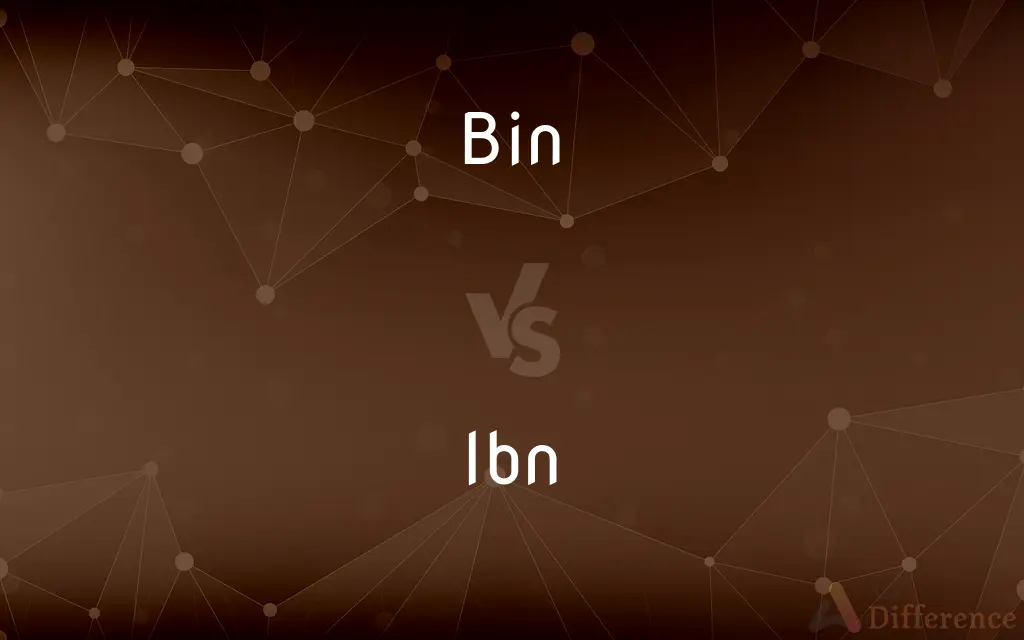Bin vs. Ibn — What's the Difference?
Edited by Tayyaba Rehman — By Maham Liaqat — Updated on March 22, 2024
Bin denotes lineage or sonship in Arabic names, while Ibn directly translates to "son of."

Difference Between Bin and Ibn
Table of Contents
ADVERTISEMENT
Key Differences
Bin is commonly used in Arabic names to signify "son of," linking an individual's name with that of their father or ancestor, reflecting family lineage and heritage. Ibn, on the other hand, also means "son of" in Arabic, but it is more traditionally used in classical texts and historical contexts, often seen in scholarly or historical names.
While both terms are used to denote sonship or lineage in Arabic cultures, bin is more prevalent in contemporary usage, especially in the Gulf region, serving as a connector in names. Ibn tends to appear in more formal, classical, or historical contexts, such as in the names of scholars, historians, or figures from Islamic history.
The usage of bin in a name typically follows the individual's first name and precedes the father's name, illustrating a direct lineage. Ibn is used similarly but might be found more often in historical texts or in the context of emphasizing scholarly or historical lineage.
In terms of linguistic nuances, bin might be used more flexibly in modern contexts, adapting to local dialects and contemporary naming conventions. Ibn, while still understood and recognized, carries a more classical connotation, echoing the rich historical and scholarly traditions of the Arabic-speaking world.
Despite these differences, both bin and ibn play crucial roles in conveying family connections and heritage in Arabic naming traditions, illustrating the importance of lineage and ancestry in cultural identity.
ADVERTISEMENT
Comparison Chart
Meaning
"Son of" in Arabic names
"Son of" in Arabic, traditionally used
Usage Context
More common in contemporary names
Often found in classical or historical texts
Regional Preference
Widespread in the Gulf region
Used across the Arabic-speaking world, with historical significance
Flexibility
Adapts to modern naming conventions
More fixed, with a classical nuance
Connotation
Denotes lineage and heritage
Emphasizes scholarly or historical lineage
Compare with Definitions
Bin
Serves as a cultural marker in Arabic-speaking societies.
The use of 'bin' in names is a distinctive feature of Arabic culture.
Ibn
Found in the names of scholars and historical figures.
Ibn Khaldun is known for his work in the field of sociology.
Bin
A component in Arabic names meaning "son of," denoting lineage.
Khalid bin Walid was a notable military commander.
Ibn
Denotes scholarly or historical lineage in names.
'Ibn' in a name often indicates a notable family history.
Bin
Used to link an individual's name with their father's.
In many official documents, 'bin' connects names for clarity.
Ibn
An Arabic term meaning "son of," used traditionally.
Ibn Sina, also known as Avicenna, was a polymath.
Bin
Denotes a direct relationship in genealogical terms.
'Bin' often follows an individual's first name in documents.
Ibn
Reflects a classical connection to Arabic heritage.
The use of 'ibn' in names harkens back to a rich historical tradition.
Bin
Reflects family connections in naming conventions.
'Bin' in a name can indicate a person's ancestry.
Ibn
Used in classical Arabic texts and contexts.
Many medieval manuscripts feature authors with 'ibn' in their names.
Bin
(statistics) Any of the discrete intervals in a histogram, etc
Ibn
Ibn (Arabic: ٱبْنُ) is an Arabic patronymic, meaning 'son of'. Its opposite is bint, meaning 'daughter of'.
Bin
A container or enclosed space for storage.
Ibn
(in Arabic names) son of
"Ali ibn Amr": "Ali son of Amr".
Bin
To place or store in a bin.
Bin
A box, frame, crib, or enclosed place, used as a storage container.
A corn bin
A wine bin
A coal bin
Bin
A container for rubbish or waste.
A rubbish bin
A wastepaper bin
An ashes bin
Bin
Any of the fixed-size chunks into which airspace is divided for the purposes of radar.
Bin
Jail or prison.
Bin
(in Arabic names) son of; equivalent to Hebrew tr=ben.
Bin
(computing) binary
Bin
To dispose of (something) by putting it into a bin, or as if putting it into a bin.
Bin
To throw away, reject, give up.
Bin
(statistics) To convert continuous data into discrete groups.
Bin
(transitive) To place into a bin for storage.
To bin wine
Bin
Alternative form of been
Bin
A box, frame, crib, or inclosed place, used as a receptacle for any commodity; as, a corn bin; a wine bin; a coal bin.
Bin
To put into a bin; as, to bin wine.
Bin
An old form of Be and Been.
Bin
A container; usually has a lid
Bin
The quantity contained in a bin
Bin
An identification number consisting of a two-part code assigned to banks and savings associations; the first part shows the location and the second identifies the bank itself
Bin
Store in bins
Common Curiosities
What does "bin" mean in Arabic names?
In Arabic names, "bin" means "son of," linking an individual to their father.
Is "ibn" still used in modern Arabic?
"Ibn" is less common in everyday use but still appears in formal, scholarly, or historical contexts.
Can "bin" and "ibn" be used interchangeably?
While they have the same basic meaning, their usage often depends on context, with "bin" being more common in modern names and "ibn" in classical or historical ones.
Why is lineage so important in Arabic names?
Lineage is crucial as it honors family ties and heritage, which are highly valued in Arabic cultures.
What is an example of a name using "ibn"?
"Ibn Sina," known in the West as Avicenna, is a historical figure where "ibn" signifies his lineage.
How do "bin" and "ibn" reflect Arabic culture?
Both terms reflect the importance of family and lineage in Arabic culture, though "ibn" also highlights historical and scholarly legacies.
What is an example of a name using "bin"?
An example is "Salman bin Abdulaziz," the king of Saudi Arabia, where "bin" connects Salman to his father, Abdulaziz.
Does "ibn" appear in religious texts?
Yes, "ibn" can be found in historical and religious texts, emphasizing lineage and scholarly traditions.
How do naming conventions vary across Arabic-speaking regions?
Naming conventions can vary, with some regions preferring "bin" and others using "ibn" in more formal contexts.
Do "bin" and "ibn" have specific grammatical rules in Arabic?
Yes, their usage follows grammatical rules, particularly in how they connect individual names to familial names.
Are there female equivalents for "bin" and "ibn"?
Yes, "bint" is used to indicate "daughter of" in Arabic names.
Can "bin" indicate a non-biological relationship?
Sometimes, "bin" can be used metaphorically to denote a spiritual or intellectual lineage.
What does the use of "bin" and "ibn" say about Arabic linguistic traditions?
Their usage underscores the depth of Arabic linguistic and cultural traditions, emphasizing lineage, heritage, and the importance of family ties.
Is "ibn" more formal than "bin"?
Generally, "ibn" is considered more formal and classical, often found in scholarly or historical names.
Why might someone choose to use "ibn" in their name today?
Using "ibn" might reflect a desire to connect with historical or scholarly roots, or it may be part of a family tradition.
Share Your Discovery

Previous Comparison
Teambuilding vs. Performance
Next Comparison
Kheera vs. KakdiAuthor Spotlight
Written by
Maham LiaqatEdited by
Tayyaba RehmanTayyaba Rehman is a distinguished writer, currently serving as a primary contributor to askdifference.com. As a researcher in semantics and etymology, Tayyaba's passion for the complexity of languages and their distinctions has found a perfect home on the platform. Tayyaba delves into the intricacies of language, distinguishing between commonly confused words and phrases, thereby providing clarity for readers worldwide.











































